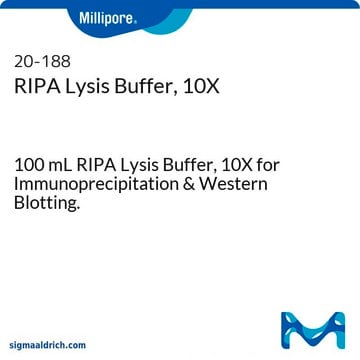H9664
Anti-HMGB1 (HMG1) (N-terminal) antibody produced in rabbit

affinity isolated antibody, buffered aqueous solution
Synonyme(s) :
Anti-Amphoterin, Anti-High mobility group box 1, Anti-High mobility group protein 1
About This Item
Produits recommandés
Source biologique
rabbit
Niveau de qualité
Conjugué
unconjugated
Forme d'anticorps
affinity isolated antibody
Type de produit anticorps
primary antibodies
Clone
polyclonal
Forme
buffered aqueous solution
Poids mol.
antigen 25 kDa
Espèces réactives
human, rat, mouse
Validation améliorée
independent
Learn more about Antibody Enhanced Validation
Technique(s)
immunoprecipitation (IP): 10 μg using HEK-293T cell lysates
indirect immunofluorescence: 1-2 μg/mL using paraformaldehyde-Triton fixed PC12 cultured cells.
indirect immunofluorescence: suitable
western blot: 1-2 μg/mL using 3T3 cell lysates
Numéro d'accès UniProt
Conditions d'expédition
dry ice
Température de stockage
−20°C
Modification post-traductionnelle de la cible
unmodified
Informations sur le gène
human ... HMGB1(3146)
mouse ... Hmgb1(15289)
rat ... Hmgb1(25459)
Description générale
Immunogène
Application
Western Blotting (1 paper)
Actions biochimiques/physiologiques
Forme physique
Clause de non-responsabilité
Vous ne trouvez pas le bon produit ?
Essayez notre Outil de sélection de produits.
Produit(s) apparenté(s)
Code de la classe de stockage
10 - Combustible liquids
Équipement de protection individuelle
Eyeshields, Gloves, multi-purpose combination respirator cartridge (US)
Faites votre choix parmi les versions les plus récentes :
Certificats d'analyse (COA)
Vous ne trouvez pas la bonne version ?
Si vous avez besoin d'une version particulière, vous pouvez rechercher un certificat spécifique par le numéro de lot.
Déjà en possession de ce produit ?
Retrouvez la documentation relative aux produits que vous avez récemment achetés dans la Bibliothèque de documents.
Notre équipe de scientifiques dispose d'une expérience dans tous les secteurs de la recherche, notamment en sciences de la vie, science des matériaux, synthèse chimique, chromatographie, analyse et dans de nombreux autres domaines..
Contacter notre Service technique








